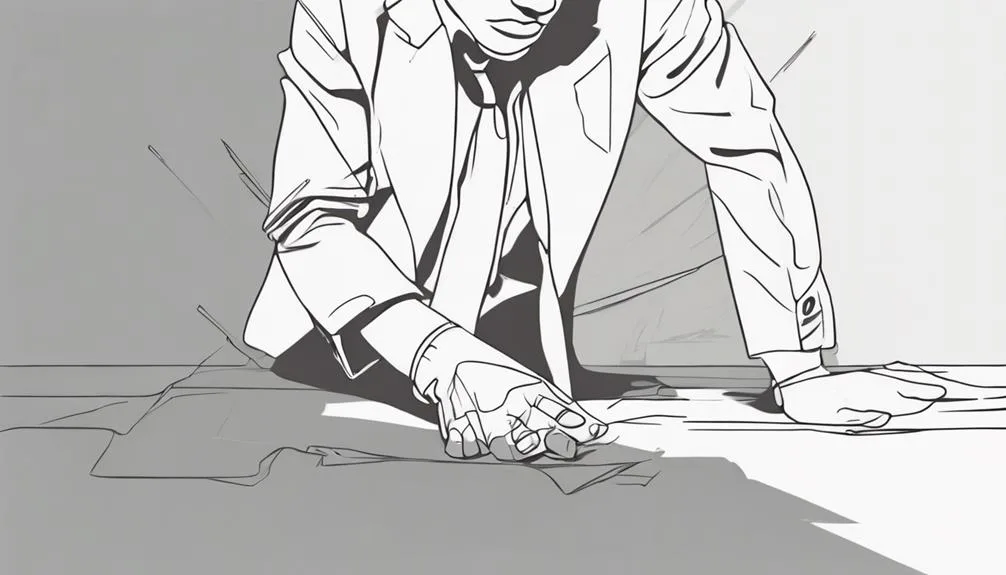Discovering signs of a controlling relationship is crucial for your well-being. Watch out for these 8 subtle yet damaging behaviors:
- Excessive monitoring
- Controlling your choices
Recognizing these red flags can help you understand if your relationship might be unhealthy.
Excessive Monitoring of Activities

If your partner constantly checks your phone, tracks your location without your consent, or demands to know your every move, these behaviors indicate excessive monitoring of activities in a controlling relationship. Replacing these behaviors can be a form of privacy invasion and may stem from deep-seated trust issues. Feeling like your every move is being scrutinized can be suffocating and erode your sense of autonomy.
Experiencing such monitoring in a relationship can lead to a breakdown of trust and create a dynamic where you feel like you're constantly under surveillance. This can be emotionally draining and impact your mental well-being. Remember that healthy relationships are built on trust, respect, and mutual understanding.
If you find yourself in a situation where your partner exhibits these controlling behaviors, addressing the issue openly and honestly is important. Seeking support from a trusted friend, family member, or counselor can help you navigate the complexities of such a challenging situation. Remember, your feelings are valid, and you deserve to be in a relationship where your boundaries are respected.
Isolation From Friends and Family
It's tough when you feel like your social circle is shrinking and your family contact is being restricted.
Sometimes, those close to you mightn't understand why certain friends are being kept at a distance.
It's important to recognize when disapproval tactics are being used to isolate you from the people who care about you.
Social Circle Restrictions
Feeling cut off from your friends and family by your partner is a common sign of a controlling relationship. It's important to recognize when your social circle is being restricted, as maintaining connections outside the relationship is vital for your well-being.
Here are some key points to take into account:
- Trust issues: Controlling partners may try to create doubt in your mind about the intentions of your friends and family, leading to isolation.
- Social control: Limiting your interactions with loved ones can be a way for your partner to exert power and control over you.
- Emotional impact: Being isolated from your support network can increase feelings of loneliness and dependency on the controlling partner.
Family Contact Limits
Experiencing limitations on contacting your family members and friends can be a concerning indicator of a controlling relationship. Communication boundaries and personal space are essential aspects of any important relationship. When these boundaries are imposed by a partner to isolate you from your loved ones, it can be a red flag. It's vital to have the freedom to communicate with your family and friends without feeling guilty or fearful of repercussions. By restricting your contact with those closest to you, the controlling individual aims to maintain power and influence over you. Remember, it is okay to set boundaries in a relationship, but isolating you from your support system is not healthy. Here's a table to help you understand the impact of family contact limits:
| Effects of Family Contact Limits |
|---|
| Feelings of Isolation |
| Lack of Emotional Support |
| Increased Dependence |
Friend Disapproval Tactics
When your partner employs tactics to isolate you from your friends and family, it can be a sign of controlling behavior that undermines your social support system and independence.
Friendship dynamics and manipulation play a significant role in these situations, where your partner may use various strategies to create distance between you and your friends.
Peer pressure is often utilized to make you feel guilty or ashamed for spending time with friends, ultimately giving your partner more control over you.
Control dynamics come into play as your partner limits your interactions with friends, making you more dependent on them for social connection and emotional support.
It's important to recognize these tactics and seek support to address them.
Constant Criticism and Put-Downs
It can be incredibly hurtful to constantly receive demeaning remarks and insults from someone who's supposed to care about you. Negative comments about your appearance or abilities can chip away at your self-worth over time.
Demeaning Remarks and Insults
Receiving constant criticism and put-downs can be emotionally damaging and erode your self-esteem in a controlling relationship. It's important to recognize these emotional manipulation tactics and understand the power dynamics at play.
- Psychological Control: Constant criticism is a form of psychological control that aims to diminish your sense of self-worth and independence.
- Emotional Abuse: Demeaning remarks and insults are often used as tools for emotional abuse, creating a sense of power and control over you.
- Impact on Self-Esteem: Over time, these negative comments can chip away at your self-esteem, making you doubt your own worth and capabilities.
Negative Comments About Appearance
Constantly hearing negative comments about your appearance can deeply affect your sense of self-worth and confidence in a controlling relationship. Criticisms about your body image can chip away at your self-esteem, making you question your worth and beauty.
When someone consistently puts you down based on your appearance, it can create a toxic environment where you may start to believe these hurtful remarks. Such negative comments not only impact how you view yourself but also influence your overall well-being.
Undermining Self-Worth Consistently
Consistently receiving criticism and put-downs can deeply erode your sense of self-worth and confidence in a controlling relationship. It is crucial to recognize that these hurtful words aren't a reflection of your true value. Remember, you deserve to be treated with respect and kindness.
Self care practices:
Engage in activities that make you feel good about yourself, whether essential exercising, meditating, or spending time with loved ones.
Healthy relationships:
Surround yourself with individuals who uplift and support you. Healthy relationships are built on mutual respect and encouragement.
Seek support:
Don't hesitate to reach out to a therapist, counselor, or support group. Talking to someone can help you process your feelings and regain your self-worth. Remember, you're worthy of love and respect.
Dictating What You Wear or Do
If your partner frequently dictates what you wear or do, it could be a sign of a controlling relationship. It's essential to remember that you have the right to clothing autonomy and the freedom to express yourself. Healthy relationships respect your personal expression and allow you the freedom of choice within the relationship boundaries.
| Signs of Controlling Relationships | Dictating What You Wear or Do |
|---|---|
| Negative Impact | Positive Approach |
| – Diminished self-esteem | – Encouraging self-expression |
| – Loss of personal identity | – Respecting individual choices |
| – Increased anxiety and stress | – Fostering independence |
| – Difficulty in asserting boundaries | – Promoting mutual respect |
Making Major Decisions Without Input

Making major decisions without taking your input into account can indicate a lack of respect and collaboration in a relationship, potentially leading to feelings of disempowerment and frustration. Having a voice in significant choices that affect your life together is crucial. Here are some key points to bear in mind:
- Financial Control: When one partner makes major financial decisions without consulting the other, it can create a power imbalance and lead to feelings of financial insecurity and dependence.
- Emotional Manipulation: Being left out of important decisions can be a form of emotional manipulation, making you feel like your opinions and feelings don't matter in the relationship.
- Decision Making Autonomy: Healthy relationships involve mutual decision-making where both partners have the freedom to express their thoughts and opinions, ensuring that choices are made collaboratively rather than unilaterally.
Extreme Jealousy and Possessiveness
In relationships, extreme jealousy and possessiveness can indicate underlying issues of insecurity and control, potentially causing distress and strain on the relationship dynamics. Feeling jealous at times is normal, but when it becomes excessive and leads to possessive behavior, it can harm the trust between partners. Trust building is essential in any relationship, and extreme jealousy can erode that trust over time. It's important to establish healthy communication boundaries where both partners feel secure expressing their feelings without fear of judgment.
If you find yourself or your partner exhibiting signs of extreme jealousy and possessiveness, it's important to address these issues openly and honestly. Acknowledge each other's feelings and work together to understand the root causes behind these emotions. Seeking support from a therapist or counselor can also be beneficial in working through these challenges. Remember, a relationship should be built on mutual trust, respect, and understanding, and addressing issues of extreme jealousy and possessiveness is a step towards fostering a healthier and more balanced connection.
Gaslighting and Manipulation

Gaslighting and manipulation are toxic behaviors that can gradually chip away at your sense of reality and self-worth in a relationship. It's crucial to recognize these mental manipulation tactics and emotional control techniques for what they're to protect yourself from further harm.
- Gaslighting: This manipulative tactic involves making you doubt your perceptions, memory, and even sanity. The gaslighter may deny things they said or did, causing you to question your own reality.
- Emotional Control: Manipulators often use your emotions against you, making you feel guilty or responsible for their behavior. They may play on your insecurities to maintain control over you.
- Manipulation Tactics: Be aware of subtle manipulation tactics such as love bombing followed by withdrawal, creating a cycle of highs and lows that keep you emotionally dependent.
Lack of Respect for Boundaries
When boundaries are consistently disregarded in a relationship, it can erode trust and create feelings of discomfort and unease. Your autonomy, the right to make your own choices and decisions, is an essential part of who you are. In healthy relationships, boundaries are respected, and your autonomy is honored. However, in controlling relationships, these boundaries are often violated, leading to emotional manipulation and a sense of powerlessness.
It's important to recognize when your boundaries aren't being respected. Emotional manipulation can manifest in subtle ways, making you doubt your own judgment or feelings. Your partner might try to control where you go, who you see, or what you do, crossing the line from care and concern into infringement on your independence. This violation of autonomy can leave you feeling trapped and isolated, unsure of how to assert your needs and desires.
Conclusion
Remember, recognizing the signs of control in a relationship is the first step towards reclaiming your agency and well-being. Trust your instincts, seek support if needed, and remember that you deserve a relationship founded on mutual respect and empowerment.
Your happiness and freedom from manipulation are paramount. You deserve to thrive in a relationship that nurtures and uplifts you.

